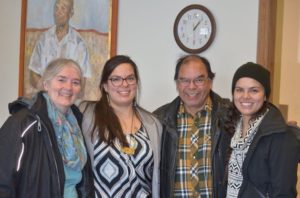Whitefish River First Nation citizen earns doctorate

By Barb Nahwegahbow
GUELPH—Dr. Marlene Paibomesai has a nice ring to it. This 30-year-old citizen of Whitefish River First Nation successfully defended her thesis at the University of Guelph on January 11, to earn her doctorate. Her parents, Finian and Lynn Paibomesai, and her sister Marion were there to support her during the grueling defense process, beaming with justifiable pride.
Paibomesai’s research focuses on dairy cattle—the passion of her life.
“[My project] was to look at the dairy cattle immune response, look at the particular cells in that immune response and how these epigenetics might relate to the immune response in cattle,” explained Paibomesai. “Epigenetics is trying to explain gene-environment interaction, so basically how environmental exposures can influence genes.”
Her work is fairly pioneering, she said and is the reason why she was accelerated from the Master’s program into the PhD program at the University of Guelph. Her project had a broad enough scope and they determined that she’d be a good PhD candidate. She had earned her Bachelor of Science degree at McMaster University and switched to Guelph because of their agricultural focus.
It was a summer job with the Ontario Ministry of Agriculture and working with a dairy specialist that inspired her love of dairy cattle and genetics. For the last two and a half years, she’s been employed full-time with the Ministry as a dairy specialist. She loves her job there and plans to stay put working with dairy cattle as well as goats and sheep.
One thing that slowed down her thesis work last year was suffering a concussion while playing hockey. Paibomesai was ordered to take time off from both mental and physical activity and to stay away from the computer. The doctors are never certain, she said, whether your cognitive ability will come back. She believes she has made good progress, adding she was back at work on her thesis in August. The majority of the thesis was written, but still required revisions, along with the preparation for her defense.
“It’s surreal. It feels good,” she said when discussing her successful thesis defense. “But to be completely honest, it hasn’t completely hit me yet. Maybe once I have the book, my bound thesis in hand, it’ll hit me.”
She couldn’t have done it without the support of family and friends, stated Paibomesai. A partner who made sure she had meals and clean laundry was essential, she added. He was also understanding about the times when she would sit and think, or read, write and study for hours at a time. Her parents were supportive too, even though they didn’t always understand what she was doing, she explained.
“When they came to my defense, it was their first opportunity to experience and see first-hand of what I had done, to see what this degree was about,” stated Paibomesai.
The financial support from her community, Whitefish River First Nation played a crucial role.
“It helped so much because tuition is so expensive,” explained Paibomesai. “It’s not an easy feat working and going to school and trying to get everything done. Having that financial help really makes a big difference.”
She also applied for awards, bursaries and scholarships and took advantage of competitions for papers and presentations.
“It helped me buy the tools I needed like a computer to help me work more effectively,” she noted.
On behalf of Whitefish River First Nation, Chief Franklin Paibomsai expressed congratulations to the new graduate.
“We extend our congratulations to Marlene. Perseverance, tenacity, and cogency are essential tools required to complete a Ph.D. program. Over many decades, Whitefish River has invested and promoted education. We see education as one of the most effective ways to empower our citizens. Marlene’s accomplishments reinforces the commitment we have made to education.”

